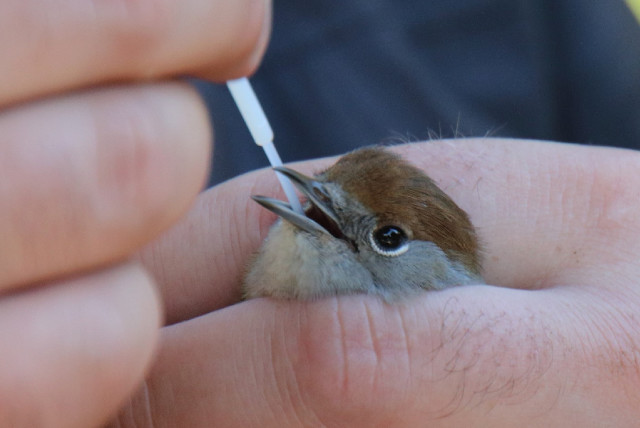The secret to migratory birds' survival: Eating feces

Consuming feces modifies bacteria and microbes in the birds’ digestive tract, allowing them to adapt to new environments.
While puppies have been known to do it, some may be surprised to discover that some bird species eat feces. We all know that the early bird gets the worm, but new research shows they prefer something far more nutritious for their breakfast.
Bird feces – either their own, or from other birds – provide them with essential nutrients and energy, and helps them adapt to new environments and seasonal variations, especially when they are developing, according to new research led by Dr. Barbara Drigo and published in the journal Biological Reviews under the title “Impacts of coprophagic foraging behaviour on the avian gut microbiome.”
Eating droppings (known scientifically as coprophagy) shapes wild birds’ digestive tracts (gut biota), enabling them to absorb lost or deficient nutrients and adjust to seasonal variations in food sources.
In fact, unlike mammals, birds lack separate exits for urine and feces. Instead, both waste products are eliminated together through the cloaca. They convert them to uric acid or guanine, which reduces water loss in comparison. Uric acid thus forms a white sticky paste, so the white part is actually bird pee; it is the dark center that is the poop. Migratory birds don’t drink much water, transitioning between fasting and fueling metabolic states because liquid in the bladder would weigh them down during long flights around the world.
Much like fecal transplant therapy for humans with gastroenterological problems, coprophagy may support the establishment of the gut microbiota of young species, directly and indirectly provide nutritional and energetic requirements, and represent a mechanism by which birds can rapidly adapt the microbiota to changing environments and diets.
Self-medicating with feces
Lead author Dr. Barbara Drigo, a microbial ecologist at the university, said that consuming feces modifies bacteria and microbes in the birds’ digestive tract, allowing them to adapt to new environments. There is also some evidence that ingesting it could be a form of self-medication to fight infections in birds, although more research is needed to confirm this theory.
While coprophagy provides birds with essential nutrients, it also has a downside, Drigo added, because birds can potentially carry and transmit diseases to other birds and humans via their feces.
“Depending on their geographical range, behavior, and interactions with other animals and environments, birds – especially migratory ones – can efficiently spread pathogens around the world. “Eating bird droppings may also increase their exposure to antimicrobials, particularly pesticides and cleaning products, which lead to antimicrobial resistance,” she said.
Although this is widely disregarded everywhere out of ignorance, including in Israel, humans should never feed bread to birds because it lowers diversity in their gut microbiota; if birds eat food from natural sites, their digestive tract is much healthier. “Birds foraging in human environments are exposed to chemicals and metals from waste, sewage and refuse, which can alter their microbiota, potentially leading to antimicrobial resistance.”
Drigo noted that a healthy avian gut is essential for regulating birds’ biological functions, and eating feces plays a significant role in this. However, while coprophagy is inherently beneficial, it can expose birds to harmful antimicrobial substances.
“There’s an urgent need to thoroughly explore how various forms of coprophagy impact avian gut microbiomes, affecting bird health across their different life stages and environments,” concluded.
Jerusalem Post Store
`; document.getElementById("linkPremium").innerHTML = cont; var divWithLink = document.getElementById("premium-link"); if (divWithLink !== null && divWithLink !== 'undefined') { divWithLink.style.border = "solid 1px #cb0f3e"; divWithLink.style.textAlign = "center"; divWithLink.style.marginBottom = "15px"; divWithLink.style.marginTop = "15px"; divWithLink.style.width = "100%"; divWithLink.style.backgroundColor = "#122952"; divWithLink.style.color = "#ffffff"; divWithLink.style.lineHeight = "1.5"; } } (function (v, i) { });

